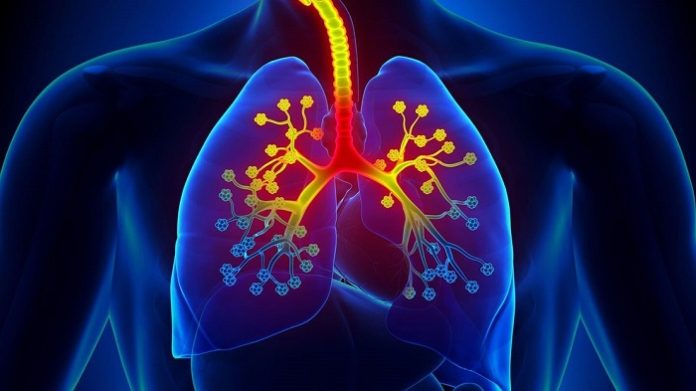Lung cancer kills millions annually. Lung cancer is prevalent. Smoking causes lung cancer. According to data, smoking causes 25% of lung cancer worldwide. This showed additional factors affecting lung cancer risk.
Asthma is a frequent childhood condition. 10% of 6–7-year-olds globally have asthma. Chronic lung inflammation makes airways sensitive, produces too much mucus, and limits lung capacity. These symptoms make breathing difficult. Inflammation promotes cancer. Chronic inflammation, like asthma, may lead to lung cancer. Multiple studies have linked asthma to lung cancer. The results are unclear.
Studies Linking Asthma to Lung Cancer
Most asthma-lung cancer studies were inconclusive. These investigations provide new explanations.
A 2017 meta-analysis indicated that asthmatics were more likely to get lung cancer. Asthma increases lung cancer risk by 44%. European and Asian smokers had this inclination. Lung adenocarcinoma, more common in women, younger persons, and non-smokers, did not raise the risk.
A significant 2019 study examined cancer, asthma, and allergic reactions. Asthmatics had a 25% greater lung cancer risk. Asthma did not cause breast or prostate cancer. Allergies reduced lung cancer risk by 20%. Allergies were not linked to breast or prostate cancer.
Lung cancer ex-smokers are more at risk, according to certain studies. UK research found that severe asthmatics who never smoked had a 32% greater risk of lung cancer. 1.2 million were studied.
Types of Lung Cancer and Asthma
After significant scientific research, asthma, and lung cancer appear to have no connection. What’s amazing? Lung adenocarcinoma is most common in non-smokers, despite their asthma risk. The International Lung Cancer Consortium examined asthma’s influence on each subtype of lung cancer. Asthma increases the risk of small cell lung cancer (71%) and squamous cell carcinoma (69%). Asthma was linked to lung cancer by 9%.
Common Risk Factors
Asthma and lung cancer share risk variables, suggesting a relationship. Smoking or being around smokers dramatically increases asthma and lung cancer risk. Most studies that “control” smoking study asthma and lung cancer. “Controlled studies” employ this strategy to eliminate smoking as a possible cause. Even treated asthma increases lung cancer risk.
How Asthma May Cause Lung Cancer
Chronic lung inflammation in asthmatics may increase their risk of lung cancer. Recent research has linked chronic inflammation to numerous cancers. Asthma-related lung inflammation may “cofactor” lung cancer. Asthma and other factors may increase lung cancer risk. As is becoming apparent, genetic susceptibility (genetic polymorphisms) may be one of the “other” variables linked to lung cancer in non-smokers.
Cancer is more complicated than clone multiplication. Cancer cells collaborate with surrounding tissues. This is the “tumor microenvironment.”
Fibroblasts in the bronchi cause asthma. Laboratories examine lung cancer cells and human bronchial fibroblast signals. This study used asthmatic and non-asthmatic fibroblasts. Asthmatic fibroblasts boosted lung cancer cell motility. This study did not examine whether the actions observed in a living human body would only influence preexisting lung cancer cells. The data suggest that molecular research may explain the asthma-lung cancer link.
Reducing Lung Cancer Risk with Asthma
Although asthma and lung cancer seem unrelated, they share several startling risk factors. Chronic lung illness asthma causes airway inflammation and constriction. It may cause lung cancer, according to studies. A recent study has revealed asthmatic lung cancer prevention techniques. Despite the difficulty, research has linked numerous ailments. Let us explore the link between asthma and lung cancer.
Shared Biological Factors: Scientists have shown that asthma and lung cancer share some underlying traits, which illuminates their relationship. Chronic inflammation in asthma increases lung cancer risk. Inflamed areas may increase lung cancer risk for asthmatics.
The Impact of Medications: Asthma patients often use bronchodilators and ICS. Some studies suggest these drugs help lower lung cancer risk. ICS and bronchodilators’ anti-inflammatory and bronchodilatory effects may reduce lung cancer risk in asthmatics.
Behavioral Factors: Asthmatics face unique lung cancer risks due to lifestyle choices. Asthmatics should avoid smoking and environmental chemicals and maintain lung health. Asthmatics who adopt healthy habits may lower their lung cancer risk.
Genetic Predispositions: Asthma and lung cancer run in families. Inflammation and detoxification genes may increase the risk of certain diseases in some persons. Genetic studies may lead to new asthma and lung cancer treatments.
Integrating Asthma Management and Lung Cancer Prevention
Asthma and lung cancer prevention are promising medicinal fields. Asthma control requires regular doctor visits, medication adherence, and asthma action programs. But quitting smoking is crucial. Everyone gains. Quitting cigarettes reduces lung cancer risk and improves asthmatics’ quality of life. Education about climate change and secondhand smoking reduction is vital. This multimodal approach can improve lung health and prevent cancer.
Optimal Asthma Control: Asthma management reduces lung cancer risk.
Also read: How do Steroids Help In Asthma & COPD?
Inflammation can be controlled, and regular doctor visits, medication adherence, and an asthma action plan can reduce chronic asthma’s long-term effects.
Smoking Cessation: Asthmatic smokers should quit. Smoking causes asthma and lung cancer, making expert aid essential to quitting. Counseling, nicotine replacement, and behavioral therapy can help smokers quit.
Environmental Awareness: Asthmatics should avoid environmental allergens and contaminants. This reduces lung cancer risk. Avoid secondhand smoke, air pollution, and occupational hazards. Clean air and safety procedures can improve lung health and cancer prevention.
Ayurvedic Perspective on Asthma and Lung Cancer Treatment
Ayurveda treats asthma and lung cancer differently. Traditional medicine considers the body, mind, spirit, and environment. Ayurveda emphasizes dosha balance to treat asthma. Ayurvedic asthma treatment focuses on herbs, breathing exercises, and food.
Ayurveda links lung cancer to doshic imbalances, nutrition, and pollution. The current therapy paradigm emphasizes boosting the immunological and detoxification systems. Panchakarma involves Vamana (induced vomiting) and virechana (induced purging). The treatment aims to cleanse the body and restore balance. A balanced diet with herbs and spices can help improve health and reduce lung cancer risk.
Ayurveda has valuable ideas, but it should be integrated with Western medicine. When traditional and alternative doctors collaborate, asthma and lung cancer patients obtain better care.
Ayurveda’s alternative worldview can improve traditional medicine. They can balance, cleanse, and improve health. To ensure safety and efficacy, Ayurveda must be utilized as part of an integrated health approach and in cooperation with qualified doctors. Traditional and modern medical knowledge may help asthma and lung cancer patients survive.
Conclusion
Despite the complexity of the asthma-lung cancer link, researchers have uncovered numerous surprising links and risk factors. Standard biological components, drug effects, behavioral cues, and genetic predispositions complicate this complicated picture. In asthmatics, persistent inflammation and drug usage may increase lung cancer risk, but lifestyle and environmental factors also play a role.
The most critical stages are stopping smoking, controlling asthma, and reducing environmental irritants. Genetic differences also support customized preventative care. By studying all these risk variables, we can improve clinical outcomes and pulmonary health by understanding lung cancer and asthma mechanisms.
Being the Best Cancer Hospital in Kerala, Punarjan Ayurveda dedicates all its services to eliminating the deadly fear of cancer.







